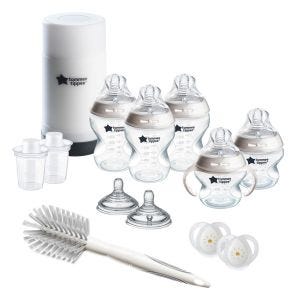
This is a demo store. No orders will be fulfilled.
Subscription orders can be cancelled at anytime. Free delivery on all subsequent subscription orders. Find out more about subscriptions.
They’re easy and fuss free
Your products are automatically sent to you
You save up to 10% when you sign up for a subscription
You can cancel at any time
Parents-to-be needs to be mindful of their dietary choices during pregnancy because what you eat and drink can have a significant impact on both your health and the health of your developing baby.
In addition to incorporating nutritious foods into your diet, it's also important that you're aware of the foods you should steer clear of during pregnancy. Let's run through some of the foods that pregnant people should avoid and explain why they can be harmful.
Yes, but all seafood dishes should be cooked to 145��F and raw seafood should be avoided because of the risk of parasites or bacteria, including listeria.
Yes, shrimp are safe to eat while you're pregnant, but they can cause food poisoning if eaten raw, so they should be cooked through until steaming hot.
Cooked lobster is safe to eat, but if it's eaten raw it can cause food poisoning. Any lobster you eat while pregnant should be cooked through until steaming hot.
Cooked squid is safe to eat but it can cause food poisoning if eaten raw. Squid should be fully cooked through until steaming hot.
Cooked mussels are safe to eat, but raw ones should be avoided because they can cause food poisoning. They need to be fully cooked through until steaming hot, and you should always discard any mussels that stay closed after cooking.
It's also worth noting that mussels and clams are often cooked in a white wine sauce that needs to be thoroughly cooked to allow the alcohol to evaporate. For this reason, some pregnant people choose to avoid sauces cooked with wine or other types of alcohol.
Cooked oysters are safe to eat but raw ones can cause food poisoning. They should be fully cooked through until steaming hot.
Yes, but you should cook them until the yolks and whites are firm.
Yes, you can eat commercial mayonnaise that's made using pasteurized eggs.
Yes, most cheese is safe to eat uncooked if it's been made with pasteurized milk.
Mold-ripened soft or blue-veined cheeses like gorgonzola, camembert, or brie are only safe to eat if they've been cooked.
Avoid soft cheeses, such as brie, feta, and blue cheese, unless they are clearly labeled as being pasteurized or made with pasteurized milk.
Yes, pasteurized mozzarella is safe to eat uncooked, but unpasteurized mozzarella needs to be cooked first, for example on a pizza.
Some fish and shellfish contain potentially dangerous levels of mercury, so the Food and Drug Administration (FDA) encourages pregnant people to avoid:
Use this specially designed chart to understand which and how much fish is safe to eat during pregnancy.
You should avoid refrigerated, uncooked seafood, even if it's been smoked. Examples include fish that's labeled nova style, lox, kippered, smoked, or jerky.
Refrigerated pate or meat spreads should be avoided, but canned pate or shelf-safe meat spreads can be eaten during pregnancy.
Smoked or cured meats are safe to eat as long as they're cooked first in a casserole or other cooked dish.
Consuming large amounts of caffeine while you're pregnant can affect the growth and development of your unborn baby and can increase the risks of miscarriage.
It's best to limit your caffeine intake and have no more than 200mg per day - that's approximately two cups of instant coffee or four cups of tea. Don't worry - you can always switch to decaf!
You should avoid caffeinated energy drinks.
If you're pregnant or planning a pregnancy, the safest approach is not to drink alcohol at all, to keep risks to your baby to a minimum.
A tasty and healthy alternative to drinking alcohol while you're pregnant is non-alcoholic ginger beer. As well as being super scrumptious, ginger is also perfect for fighting morning sickness and nausea - win, win.
You should make sure that any milk you drink is pasteurized because unpasteurized milk can contain listeria.
You should avoid drinking herbal tea because there's little data on the effects of specific herbs on developing babies. If you'd like to drink herbal tea while pregnant, it's best to check with your healthcare provider first.
Although artificial sweeteners in moderation are safe for pregnancy, you should try to avoid consuming too many sugary drinks during pregnancy.
The truth is that 'eating for two' is a bit of a myth. During the first six months of pregnancy the energy requirements of mums-to-be do not increase because your body adapts and becomes much more efficient at utilising the energy and nutrients from the food you eat.
When it comes to the last three months of pregnancy however, you may need an extra 200 calories or so a day to accommodate your growing baby.
It's normal for your appetite to fluctuate and your weight gradually increase during pregnancy, so it's important to listen to your body. But it's also important not to eat too much, and on the flip side, don't attempt to diet or lose weight during your pregnancy. Too much weight gain or loss can affect the health of you and your baby.
Sources